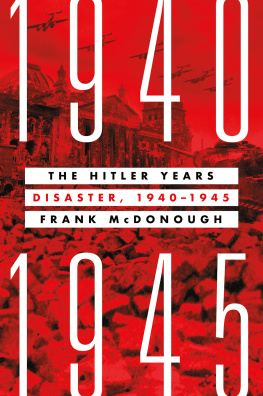PENGUIN BOOKS
HITLER 19361945
Ian Kershaw has long been recognized as the world expert on Adolf Hitlers role in the Third Reich this book is not likely to be bettered in the foreseeable future Brendan Simms, The Times Higher Education Supplement
Masterly As readable and gripping as the first, it explains the personality of Hitler more convincingly than anything else Ive read and at the same time sets out in brilliant detail what happened to Germany as a whole during the Second World War Miriam Gross, Sunday Telegraph, Books of the Year
Rich in material, balanced, perceptive, humane and very well written altogether a magnificent achievement David Blackbourn, London Review of Books
There is not a better and more complete biography of Hitler and his epoch and its hard to imagine that it could soon be superseded Alexander Gallus, Rheinischer Merkur
Monumental This massive, extensively researched, extraordinarily balanced, and remarkably judicious study is likely to remain the definitive biography for a long time to come Omer Bartov, New Republic
This second volume of Ian Kershaws magnum opus is even more fascinating than its predecessor, Hubris Antony Beevor, Independent, Books of the Year
It is a masterly work; comprehensive, balanced, authoritative, and above all readable. If there is one book that explains Hitlers success in securing and maintaining power, and in consequence the causes of the Second World War, this is it Sir Michael Howard, The Times Literary Supplement, International Books of the Year
A masterpiece which leaves all previous Hitler biographies in the shade Enrico Syring, Das Parlament
Compared to the many others that came earlier, even the important and illuminating works by Alan Bullock and Joachim Fest, Kershaws large-scale study is more probing, more judicious, more authoritative in its rich detail and yet more commanding in its mastery of the horrific narrative Milton J. Rosenberg, Chicago Tribune
Enthralling and terrifying this is classic narrative history at its best, written with verve and passion David Marquand, New Statesman, Books of the Year
An impressive, detailed, and sobering story Gordon A. Craig, New York Review of Books
ABOUT THE AUTHOR
Ian Kershaw is Professor of Modern History at the University of Sheffield and one of the worlds leading authorities on Hitler. He was the historical adviser to the two BBC series The Nazis: A Warning from History and War of the Century. He is also the author of The Hitler Myth: Image and Reality in the Third Reich, Popular Opinion and Political Dissent in the Third Reich, Bavaria 193345 and The Nazi Dictatorship: Problems and Perspectives of Interpretation; the editor of Weimar: Why Did German Democracy Fail? and Hitler: A Profile in Power; and co-editor, with Moshe Lewin, of Stalinism and Nazism: Dictatorships in Comparison. Hitler 18891936: Hubris was shortlisted for the 1998 Whitbread Biography Award and the first Samuel Johnson Prize for Non-Fiction. Hitler 19361945: Nemesis was shortlisted for the 2000 Whitbread Biography Award, and was awarded the Bruno Kreisky Prize in Austria for the Political Book of the Year and the Wolfson Literary Award for History for 2000.
HITLER
193645: NEMESIS
Ian Kershaw

PENGUIN BOOKS
PENGUIN BOOKS
Published by the Penguin Group
Penguin Books Ltd, 80 Strand, London WC2R 0RL , England
Penguin Putnam Inc., 375 Hudson Street, New York, New York 10014, USA
Penguin Books Australia Ltd, 250 Camberwell Road, Camberwell, Victoria 3124, Australia
Penguin Books Canada Ltd, 10 Alcorn Avenue, Toronto, Ontario, Canada M4V 3B2
Penguin Books India (P) Ltd, 11, Community Centre, Panchsheel Park, New Delhi 110 017, India
Penguin Books (NZ) Ltd, Cnr Rosedale and Airborne Roads, Albany, Auckland, New Zealand
Penguin Books (South Africa) (Pty) Ltd, 24 Sturdee Avenue, Rosebank 2196, South Africa
Penguin Books Ltd, Registered Offices: 80 Strand, London WC2R 0RL , England
www.penguin.com
First published by Allen Lane The Penguin Press 2000
Published in Penguin Books 2001
13
Copyright Ian Kershaw, 2000
All rights reserved
The moral right of the author has been asserted
Except in the United States of America, this book is sold subject to the condition that it shall not, by way of trade or otherwise, be lent, re-sold, hired out, or otherwise circulated without the publishers prior consent in any form of binding or cover other than that in which it is published and without a similar condition including this condition being imposed on the subsequent purchaser
ISBN: 978-0-14-192581-3
CONTENTS
LIST OF ILLUSTRATIONS
Every effort has been made to contact all copyright holders. The publishers will be glad to make good in future editions any errors or omissions brought to their attention. (Photographic acknowledgements are given in brackets.)
LIST OF MAPS
PREFACE
The first part of this study, Hitler, 18891936: Hubris, tried to show how the people of a highly cultured, economically advanced, modern state could allow into power and entrust their fate to a political outsider with few, if any, special talents beyond undoubted skills as a demagogue and propagandist.
By the time his Chancellorship was devised through the intrigues of influential individuals close to Reich President von Hindenburg, Hitler had been able in free elections to garner the votes of no more than a good third of the German electorate. Another third on the Left stood implacably opposed, though internally in disarray. The remainder were often sceptical, expectant, hesitant, and uncertain. By the end of the first volume we had traced the consolidation of Hitlers power to the point where it had become well-nigh absolute. Internal opposition had been crushed. The doubters had been largely won over by the scale of an internal rebuilding and external reassertion of strength which, almost beyond imagination, had restored much of the lost national pride and sense of humiliation left behind after the First World War. Authoritarianism was seen by most as a blessing; repression of those politically out of step, disliked ethnic minorities, or social misfits approved of as a small price for what appeared to be a national rebirth. While the adulation of Hitler among the masses had grown ever stronger, and opposition had been crushed and rendered inconsequential, powerful forces in the army, the landed aristocracy, industry, and high ranks of the civil service had thrown their weight behind the regime. Whatever its negative aspects, it was seen to offer them much in advancing their own interests.
Hitler, by the time the first volume drew to a close with the remilitarization of the Rhineland in 1936, enjoyed the support of the overwhelming mass of the German people even most of those who had not voted for him before he became Chancellor. From the depths of national degradation, most Germans were more than content to share the new-found national pride. The sense that Germany was well on its way to becoming the dominant power in Europe was widespread. Hitlers own profound sense of personal degradation, felt in his Vienna years, had long since been supplanted by a gathering sense of political mission that of Germanys redeemer from chaos and champion against the dark and menacing forces challenging the nations very existence. By 1936, his narcissistic self-glorification had swollen immeasurably under the impact of the near-deification projected upon him by his followers. By this time, he thought himself infallible; his self-image had reached the stage of outright hubris.
Next page












